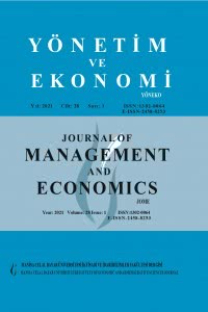Türkiye ve Diğer OECD Ülkelerinde Vergi Takozu
Vergi takozu bir
işçinin işverene toplam maliyeti ile işçinin eline geçen net ücret arasındaki
farkı ifade eden bir kavramdır. İşçinin brüt ücretinden yapılan yasal
kesintiler ve işveren tarafından yapılan zorunlu ödemelerdeki değişim vergi
takozunu etkilemektedir. Vergi takozundaki değişimin ise, bir ülkede işgücü
maliyeti, işsizlik ve kayıt dışı istihdamı etkilediği kabul edilmektedir. Bu
itibarla, uluslararası karşılaştırmalarda vergi takozu oranları, işgücü
maliyeti, işsizlik ve kayıt dışı istihdamın önemli bir göstergesidir. Bu
çalışmada, Türkiye ve diğer OECD ülkelerindeki vergi takozu oranları
karşılaştırmalı olarak analiz edilmekte, vergi takozunun farklı ülkelerdeki
artış ve azalışına yol açan düzenlemeler açıklanmaya çalışılmaktadır. Çalışmanın
amacı, farklı ülke deneyimlerinden yola çıkarak Türkiye için önerilerde
bulunmaktır. Anahtar Kelimeler: Vergi takozu, işgücü vergilendirmesi, işgücü maliyetleri
Jel Sınıflandırması: H24, J32, H20
Anahtar Kelimeler:
vergi takozu, vergi kaması
Tax Wedge in Turkey and Other OECD Countries
Tax wedge is a term which states the difference between workers'
take-home pay and what it costs to employ them. The withholdings from the gross
wage and the change in the obligatory payment made by the employer affect the
tax wedge. It is agreed that this change in tax wedge affects the labour cost,
unemployment and the shadow employment. Therefore, tax wedge rates is a
significant indicator of the labour cost, unemployment and the shadow
employment in international comparisons. In this study, the tax
wedge rates in Turkey and other OECD countries are analysed comparatively, and
the regulations leading to the increase and reduction of tax wedge in different
countries are assessed. The aim of this study is to make some suggestions for
Turkey by means of the experiences from different countries. Key Words: Tax wedge, labor taxation, labor costs
Jel Classification: H24, J32, H20
___
- CundićM. (2016), Tax wedge in Croatia, Italy, Ireland, the Netherlands and Spain, Financial Theory And Practice, 40 (2), 201-230
- Çelikkaya A. (2013), OECD Üyesi Ülkelerde Emek Üzerindeki Vergi Yükünün Gelişimi ve Türkiye Üzerine Bir İnceleme, TİSK Akademi Dergisi, 8 (16), 68-91
- Gölçek A.G., Selçuk I.Ş. & Köktaş A.M. (2018), Türkiye ve Seçilmiş Avrupa Birliği Ülkelerinde Asgari Yaşam Düzeyi: Gelir Vergisi Tarifelerin Özelinde Bir İnceleme, Ömer Halisdemir Üniversitesi İİBF Dergisi, 11 (2), 40-50
- Hodge S. A. & Hickman B. (2018), The Importance of the Tax Wedge on Laborin Evaluating Tax Systems, https://files.taxfoundation.org/20180913095728/Global-Primer_tax_wedge.pdf, (Erişim Tarihi: 17.12.2018)
- Gülşen M. İ. & Öztürk, Ş., (2016), Türkiye ve Seçilmiş OECD Ülkelerinde Ücretler Üzerindeki Vergi Takozu ve Medeni Durumun Vergileme Üzerine Etkileri, Uluslararası Ekonomik Araştırmalar Dergisi, 2 (2), 13-26
- Magda I., Kietczewska A. & Brandt N., (2018), The “Family 500+” Child Allowance And Female Labour Supply In Poland, OECD Economics Department Working Papers No:1481
- Myck M. (2016), Estimating Labour Supply Response to the Introduction of the Family 500+ Programme, Centre For Economic Analysis (CenEA) Working Paper Series WP01/16
- OECD (2006),Society at aGlance: OECD Social Indicators
- OECD (2008-2018), Taxing Wages, OECD Publishing, Paris
- Onorato M. (2016), Tax wedge in Croatia, Austria, Hungary, Poland and Greece, Financial Theory And Practice, 40 (2), 265-288
- Özbek Y. (2012), Sosyal Güvenlik Primi İşveren Payı İndirimlerinin Muhasebeleştirilmesindeki Uygulamalar ve Bir Öneri, Muhasebe ve Finansman Dergisi, 53, 87-102
- Tansöker L. R. (2017). Türkiye’de Kayıt Dışı İstihdamın Vergi Takozu Açısından Değerlendirilmesi. Yönetim Bilimleri Dergisi, 15 (30). 309-334
- WiśniewskaA., MusialM. & ŚwieckaB., (2017), The Program “Family 500 Plus” –Implications For Household Finance In Poland, CBU International Conference On Innovations In Science And Education, March 22-24, 2017, Prague, Czhech Republic, 490-494
- ISSN: 1302-0064
- Yayın Aralığı: Yılda 4 Sayı
- Yayıncı: Manisa Celal Bayar Üniversitesi İktisadi ve İdari Bilimler Fakültesi
Sayıdaki Diğer Makaleler
Halka Açıklık Oranının Finansal Performans Üzerindeki Etkisi
Cüneyt YENAL KESBİÇ, Beyza MIYNAT TAŞDEMİR
Yerel Yönetimlerde Yatırım Kriterlerinin Belirlenmesi: Bulanık DEMATEL Yöntemiyle Bir Analiz
İrfan ERSİN, Hasan DİNÇER, Serhat YÜKSEL
Şengül CAN, Tuncer ÖZDİL, Cengiz YILMAZ
İnan ERYILMAZ, Asena ALTIN GÜLOVA
Yeni Medya ve Dijital Gözetim: Türkiye’deki Sosyal Medya Kullanıcıları Üzerine Bir Araştırma
4. Sanayi Ve Enformasyon Toplumu Çerçevesinde Kamu Politikalarının Gelişimi
Aslihan ÖZEL ÖZER, Mustafa TURHAN
Türk İşletme Gruplarında Ortak Yönetim Kurulu Üye Profili
Tülay İLHAN NAS, Merve ÖZDEN, Tarhan OKAN
Bilge ÖZYILMAZ, Lale ORAL ATAÇ
